You are currently browsing the tag archive for the ‘Policies’ tag.
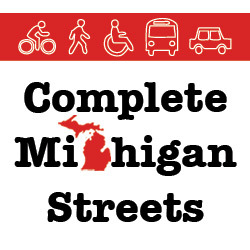 Yesterday the State Transportation Commission (STC),a six-member board that establishes policy and plans for Michigan’s transportation department, formally adopted a Complete Streets policy. The policy will direct Michigan Department of Transportation planners to keep all users in mind – including bicyclists, transit riders, motorists and pedestrians of all ages and abilities.
Yesterday the State Transportation Commission (STC),a six-member board that establishes policy and plans for Michigan’s transportation department, formally adopted a Complete Streets policy. The policy will direct Michigan Department of Transportation planners to keep all users in mind – including bicyclists, transit riders, motorists and pedestrians of all ages and abilities.
The STC invited public comment on the draft Complete Streets policy released at its June 28 meeting in Sault Ste. Marie. Many citizens and bicycle and pedestrian advocates across the state took advantage of the public comment period to request that the policy include stronger, clearer and more specific language with firm timelines for implementation. This included a petition drive led by the League of Michigan Bicyclists (LMB), which collected nearly 2500 signatures in a single week.
We thank the STC for being so responsive to the requests made by concerned citizens. Added and/or modified language strengthened the final policy providing more clarity in a number of areas as outlined below. A big thanks also goes out to all of the Michigan Complete Streets advocates who took the time to comment on the draft policy - your voices were heard!
Public Act 135 of 2010 requires the STC to enact a Complete Streets policy by August 2012. The STC has worked closely with the governor-appointed 18-member Complete Streets Advisory Council on the draft policy. The group’s role, according to law, is to advise the STC, county road commissions and municipalities on Complete Streets policies. Council members represent road and transit agencies, state agencies, walking and biking organizations, and environmental, senior citizens and disabled persons groups.
Below is a analysis of the final policy comparing it to the major revisions requested by the LMB petition.
- Strengthen implementation language.
- Identify the procedures or guidelines that will be developed or revised. – Did not include.
- Include a timeframe by which implementing documents will be developed or revised. – Included, by December 31, 2013.
- State a commitment to continue programs to educate and train MDOT personnel and other stakeholders on complete streets implementation. – Included language about training/education.
- Include language about implementation accountability. – Included language with a bit more specificity on what MDOT will report annually to the STC, but nothing about who will be responsible for developing/revising procedures, etc.
- State a commitment to continuing to base facilities design and construction on existing laws, best practices, and guidance documents. – Included language about this.
- Strengthen exception language.
- Refer to the exceptions already outlined in PA 135. – Not specifically referenced.
- Include a timeframe by which an exception procedure document will be developed. – Included, by December 31, 2013
- Include language about developing and using performance measures. – Included language about what MDOT will report annually to the STC, which stated “any information/examples to gauge MDOT’s performance.” (Not exactly what we was requested.)
- Strengthen language to direct MDOT to work with local road agencies (change “may” to “shall”). – Language was strengthened; “MDOT shall work with local road agencies that are undertaking road or bridge projects with federal funds…”
- Amend language about the network approach to expand “non-motorized” users to include all users, including people with disabilities and transit users. – Language states “all users”
- Specify whether there will be a sunset on annual reports to the State Transportation Commission. – Not specified.
Read the final policy below or download a PDF here.
 As a result of planning efforts for “Complete Streets,” the City of Lathrup Village has adopted an ordinance that will help facilitate future street, bike facility, and sidewalk improvements.
As a result of planning efforts for “Complete Streets,” the City of Lathrup Village has adopted an ordinance that will help facilitate future street, bike facility, and sidewalk improvements.
With assistance of Lathrup Village‐based Birchler Arroyo Associates, Inc., a Michigan planning firm that specializes in downtown planning and transportation consulting, the City Council and Planning Commission have been developing a Non‐Motorized Transportation Plan (NMTP), a Non‐Motorized Transportation Improvement Program (TIP), and a Complete Streets Ordinance. The purpose of these efforts is to guide the planning, design, construction and reconstruction of roadways, sidewalks, bicycle paths, and other transportation facilities, making them “Complete Streets.”
Recent legislation adopted in Michigan provides a method for achieving “Complete Streets” in communities across the state. “Complete Streets” is a relatively new term that describes a transportation network that provide safe and efficient access to users, whether they travel by car, truck, transit, assistive device, foot, or bicycle. In Lathrup Village, plans for street and sidewalk repairs are made annually. However, the City recognized the need to address non‐motorized transportation more fully and with an emphasis on improving the connectivity in and around the entire City, despite the physical boundaries of Southfield Road and I‐696, which bisect the City from east to west, and north to south, respectively.
The Reverend Oscar King III, a Lathrup Village Planning Commissioner, sums up the “Complete Streets” planning efforts by noting, “In my sense, it redefines Lathrup Village so that it becomes something more than somewhere people drive through, getting to somewhere else. It becomes a destination, a wellplanned destination, that can respond to what was, what is, and allow us to plan for the future.”
Birchler Arroyo Associates Inc. vice‐president Rod Arroyo agrees, “With the Complete Streets Ordinance, the City is taking a big picture approach to creating a complete transportation network for its residents and businesses. “ The new ordinance will require the City to consider how improvements can be made to the non‐motorized transportation network when other types of public infrastructure projects are undertaken.
The Planning Commission is holding a public hearing on the Complete Streets‐Non‐motorized Transportation Plan on November 8 and anticipates that the plan will be adopted as an amendment to the City’s Master Plan by December.
Download the Lathrop Village Complete Streets ordinance
*********
Lathrup Village, Michigan is in a highly desirable location in southern Oakland County. Conveniently located off I‐696, the City is within easy reach of the areas major cities and destinations. It has a population of over 4,500 and covers 1 1/2 square miles. The majority of its commercial uses are located on Southfield Road, an important north‐south arterial. Jeff Mueller is the City Administrator. Birchler Arroyo Associates, Inc. is a planning and transportation consulting firm located in Lathrup Village, MI. Since 1989, Birchler Arroyo Associates, Inc., has been a leader in community planning and transportation consulting in southeast Michigan. The firm’s award‐winning plans and tools have been recognized at the state and national levels for planning excellence. For more information on Birchler Arroyo Associates, Inc., please contact Rod Arroyo at 248.423.1776 or visit their website: www.birchlerarroyo.com
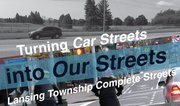 On September 13, 2011, Lansing Township passed a Complete Streets ordinance in order to promote the public health, safety, comfort, convenience, and general welfare for walking, bicycling, and public transportation and to encourage increased use of these modes of transportation as part of daily activities, while at the same time securing adequate traffic circulation to the roadways, streets and highways to achieve the maximum utility and livability on individual parcels. Lansing Township became the ninth community in Michigan to adopt a Complete Streets ordinance, but the first township to do so in the state.
On September 13, 2011, Lansing Township passed a Complete Streets ordinance in order to promote the public health, safety, comfort, convenience, and general welfare for walking, bicycling, and public transportation and to encourage increased use of these modes of transportation as part of daily activities, while at the same time securing adequate traffic circulation to the roadways, streets and highways to achieve the maximum utility and livability on individual parcels. Lansing Township became the ninth community in Michigan to adopt a Complete Streets ordinance, but the first township to do so in the state.
Because townships do not own their roadways and must work with and through county road commissions and the Michigan Department of Transportation to implement roadway projects, the ordinance is unique.
The Township committed to approaching every transportation project and program as an opportunity to collaboratively implement Complete Street practices and infrastructure in order to improve public and private streets and the transportation network for all users. It also recognizes public investments by prioritizing Complete Streets projects that are located near public service areas (e.g., schools, government facilities, libraries, public health facilities, parks, hospitals, etc.) and that provide improved access to healthy food (e.g., farmers markets, full service groceries, community gardens, etc.). The Township recognizes that not all modes of travel are appropriate on all streets and therefore outlines specific exceptions. The Township also has a detailed plan for collecting data and measuring the impact of their Complete Streets ordinance and projects.
This ordinance comes after a year-long process of exploring the benefits of Complete Streets and approaches to implementation with partners such as the Ingham County Health Department and Tri-County Regional Planning Commission. Lansing Township is also currently developing its non-motorized transportation plan which will help to implement the Complete Streets ordinance.
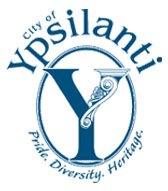 By Bob Krzewinski, Chair of the City of Ypsilanti Non-Motorized Advisory Committee
By Bob Krzewinski, Chair of the City of Ypsilanti Non-Motorized Advisory Committee
Over the summer of 2011, the City Council of the City of Ypsilanti voted on, and approved, a Complete Streets ordinance, becoming the 8th Michigan community to locally put Complete Streets into law. The Ypsilanti Complete Streets ordinance takes effect on September 17th, thirty days after the last of two required votes by City Council.
Complete Streets policies ensure that when roads are constructed, or rebuilt, they are designed and operated to enable safe access for all users. Pedestrians, bicyclists, motorists and transit riders of all ages and abilities can move safely along and across a Complete Street. They improve public safety and reduce crashes by providing dedicated pedestrian and bicycle infrastructure, such as safe crosswalks, sidewalks and on-road bicycle facilities such as bike lanes and sharrows.
Complete Streets also have an extra benefit in that they tend to boost local economies by increasing residential property values. Demand for walkable communities is growing across the country and home buyers are often willing to pay a premium to live in areas where they can safely walk and bike. Businesses located along Complete Streets corridors also often report increased sales after pedestrian, bicycle and transit facilities are installed.
Complete Streets also promotes public health by making it safe and convenient for children and families to incorporate physical activity into their daily lives. With Michigan’s rampant obesity epidemic, Complete Streets provides a golden opportunity to replace our crumbling transportation infrastructure with safe and convenient active transportation options.
By passing a Complete Streets ordinance, the City of Ypsilanti joins scores of communities across Michigan that are embracing Complete Streets, including Washtenaw County neighbors in Saline, Dexter and Ann Arbor.
With rising gasoline prices, more and more Michigan residents are walking and bicycling for both transportation and recreation. Complete Streets ordinances, such as recently enacted by the City of Ypsilanti, will certainly help make such activates not only more possible, but easier and safer.
Download Ypsilanti’s Complete Streets ordinance here.
 FOR IMMEDIATE RELEASE via
FOR IMMEDIATE RELEASE via
Disability Network/Lakeshore
The City of Otsego continued their vision of designing a healthy and accessible community at their regular scheduled City Council meeting Monday night.
Otsego City Council members unanimously approved a Complete Streets Resolution to include Complete Streets design considerations and practices as a routine part of infrastructure planning and implementation. The resolution comes after a presentation was made by Kathryn Gray, Public Policy Specialist for Disability Network/Lakeshore, to the Otsego Planning Commission at their June 27th meeting indicating the benefits of such a resolution.
Complete Streets are achieved when local organizations and agencies routinely plan, design, construct, re-construct, operate, and maintain the transportation network to improve travel conditions for bicyclists, pedestrians, and people with disabilities in a manner consistent with, and supportive of, the surrounding community.
City Manager of Otsego, Thad Beard, drafted a resolution of support for the council to vote on Monday night. Beard supported the resolution stating, “Complete Streets are for all modes of transportation, including all ages and abilities, and offers the potential for greater quality of life for our residents. Our City recognizes the importance of street infrastructure enabling safe, convenient, and comfortable travel for all users.”
Mayor Gilmer noted that passing this resolution, “will be great for our community!” Many benefits come from implementing Complete Streets including economic growth and community stability in providing accessible and efficient connections between home, work, school, recreation, and retails destinations.
Gray indicated that one of the many benefits of passing a resolution “is the potential for priority when applying for transportation enhancement grants through the Michigan Department of Transportation (MDOT).” Gray is a certified trainer of Complete Streets from the Michigan Department of Community Health’s Complete Streets Institute. “Both the Otsego Planning Commission and City Council had no objections to such a resolution and were eager to begin thinking about incorporation of Complete Streets in their planning processes.”
Over 45 Michigan communities have adopted a Complete Street ordinance or resolution. The City of Otsego joins the Cities of Holland and Allegan in Allegan County in passing such resolutions.
For more information:
Kathryn Gray, Public Policy Specialist
Disability Network/Lakeshore
(616) 396-5326
[email protected]
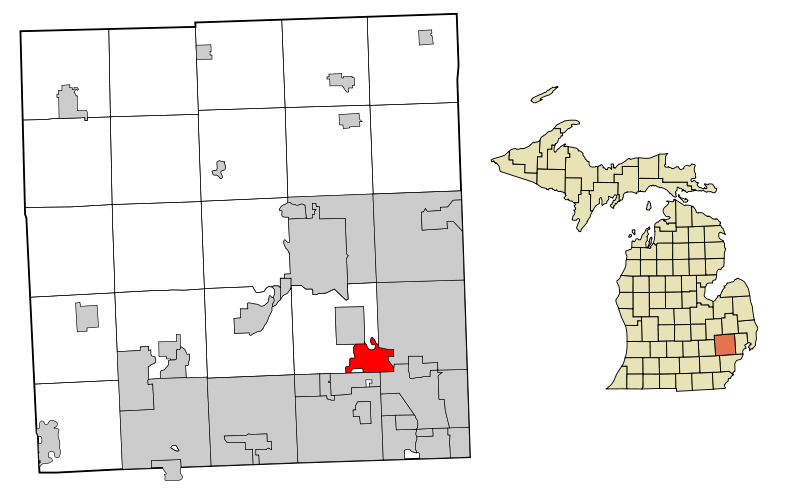 On July 11, 2011, Birmingham’s City Commission passed a Complete Streets resolution in support of multi-modal transportation planning to improve travel choices in the city. The resolution directs city staff to develop a set of proposed policies and procedures to implement Complete Streets practices. The City Commission voted unanimously to support the resolution and recognizes that while the city has long prioritized walkability, additional work remains to serve all user groups. This resolution comes after several discussions at the Planning Board about the benefits of Complete Streets and approaches to implementation. The city will move forward with identifying the most effective way to implement Complete Streets practices in its road planning process and hopes to work with other communities throughout Michigan to ensure that the city is employing best practices. By passing the Complete Streets resolution, Birmingham renews its commitment to promoting safe and convenient mobility options and improving the quality of life for all its residents.
On July 11, 2011, Birmingham’s City Commission passed a Complete Streets resolution in support of multi-modal transportation planning to improve travel choices in the city. The resolution directs city staff to develop a set of proposed policies and procedures to implement Complete Streets practices. The City Commission voted unanimously to support the resolution and recognizes that while the city has long prioritized walkability, additional work remains to serve all user groups. This resolution comes after several discussions at the Planning Board about the benefits of Complete Streets and approaches to implementation. The city will move forward with identifying the most effective way to implement Complete Streets practices in its road planning process and hopes to work with other communities throughout Michigan to ensure that the city is employing best practices. By passing the Complete Streets resolution, Birmingham renews its commitment to promoting safe and convenient mobility options and improving the quality of life for all its residents.
Download Birmingham’s Complete Streets resolution
Birmingham Patch coverage
 Taking a major step toward ensuring its streets, sidewalks and pathways are as safe, welcoming and functional as possible for all types of users, the City of Williamston has passed a Complete Streets ordinance, becoming the 7th Michigan community to do so. Adopted unanimously by the City Council at its June 12 meeting, the ordinance calls for a number of next steps, including that the City develop a Comprehensive Non-Motorized Transportation Plan to be incorporated into the City’s Master Plan when it is revised in 2012.
Taking a major step toward ensuring its streets, sidewalks and pathways are as safe, welcoming and functional as possible for all types of users, the City of Williamston has passed a Complete Streets ordinance, becoming the 7th Michigan community to do so. Adopted unanimously by the City Council at its June 12 meeting, the ordinance calls for a number of next steps, including that the City develop a Comprehensive Non-Motorized Transportation Plan to be incorporated into the City’s Master Plan when it is revised in 2012.
“This Complete Streets ordinance is the first step toward creating an even better experience for all those who travel in or through Williamston, whether they do so on foot or bike, or in a wheelchair, car or some other mode of transportation,” said Michael Gradis, Associate Planner for McKenna Associates and staff planner for the City of Williamston. “The positive effects of this ordinance will be seen very soon and yet last for generations.”
Among other things, the Complete Streets ordinance will help create better links between destinations within the City, including Williamston Schools, the commercial downtown and McCormick Park, Williamston Industrial Park, and newly constructed neighborhoods. The Non-Motorized Transportation Plan will also propose connections to surrounding communities.
With input from Williamston’s Department of Public Works and Police Department, Gradis and McKenna Principal Planner Greg Milliken, AICP, approached City Council about the merits of Complete Streets and drafted the ordinance that was eventually adopted.
The City has discussed a number of initiatives in conjunction with recent downtown streetscape and park improvements—all focused around the idea of “placemaking,” a term used to describe the process of creating spaces that are pleasurable, interesting and useful for new or existing users.
“By improving existing non-motorized infrastructure and expanding the non-motorized network throughout the City, we hope spaces once skipped over or not enjoyed will be reclaimed—particularly by new non-motorized users,” said Milliken.
Working for the City of Williamston, Gradis and Milliken have already begun drafting the Comprehensive Non-Motorized Transportation Plan and will soon conduct a series of brainstorming sessions with elected officials, other staff and the public.
By enacting the Complete Streets ordinance, Williamston has moved closer to its goals of encouraging healthy, active living; improving non-motorized mobility options; and improving the safety and quality of life of all its residents.
Download Williamston’s Complete Streets Ordinance
For more information:
Michael Gradis
Associate Planner, McKenna Associates
Staff Planner, City of Williamston, MI
248.596.0920
[email protected]
###
Reported by Paul Lamoureux, Northville Resident
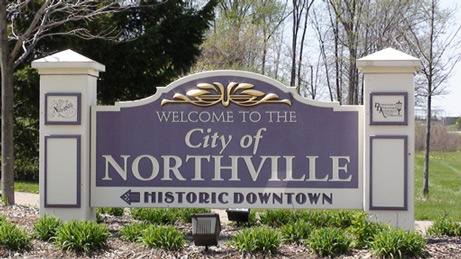
With unanimous accord, the Northville City Council adopted a complete streets resolution at its regular meeting on Monday, June 20. The measure was hailed by its author and initial proponent, City Manger Patrick Sullivan, as a necessary first step toward the establishment of a comprehensive non-motorized master plan designed to link Northville residents with nearby communities of Novi and Plymouth. It turns out Mr. Sullivan has prior, job-related experience with non-motorized infrastructure and has experienced first hand the positive community and economic benefits when a community accommodates all modes of transportation.
Several interesting facts emerged during the discussion of the resolution. Novi, with its own complete streets resolution, was cited as an example of a community benefiting from its long-standing non-motorized plan whose residents have long sought better access to commercial downtown Northville. Residents of both communities also seek a method to bike and walk to nearby Maybury State Park, a presently unsupported route and primary goal for the future. Finally, some expressed support for a better, biker-friendly connection between downtown Northville and Hines Park terminating at the city’s southern border.
A pair of Northville resident League of Michigan Bicyclists (LMB) members first approached the City Manager just a few short months ago to communicate the complete streets message. The city then availed itself of the resources provided by micompletestreets.org and the Michigan Municipal League. Upon passage of the resolution, City Council expressed their interest in further support from LMB in the drafting and implementation of the non-motorized master plan and expressed their gratitude for their leadership thus far in the process.
Marquette, Ludington, Lake Isabella, Acme Twp. and Owosso join the growing list of supportive communities!
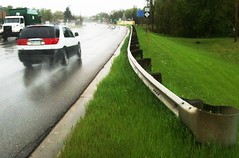
A roadway in need of complete streets in Acme Township. (photo by glhjr)
While we have been a little behind in updating this site the past few weeks, it certainly doesn’t mean there hasn’t been news worth posting about complete streets in Michigan. In fact, we are pleased to report that there have been five complete streets resolutions adopted across the state recently.
On May 9th, both the Cities of Marquette and Ludington adopted complete streets resolutions at their respective City Council meetings. The Mining Journal and the Ludington Daily News both covered the passage of these resolutions.
We also received word this month from Lake Isabella Village Manager Tim Wolff that their Village Council also adopted a complete streets resolution.
As reported on My Wheels are Turning, Acme Township became the first community in Grand Traverse County to endorse Complete Streets at their June 7th Board of Trustees meeting. They join a handful of other townships across the state who have also recently adopted complete streets resolutions. While we are extremely encouraged by the action of these communities, it still remains to be seen what sort of impact these policies will ultimately have since county road commissions actually are the ones who have jurisdiction over roads within townships. Ultimately we hope that we are seeing the beginning of a fruitful dialog between Michigan’s 1200+ townships and the 80+ county road commissions.
It also looks like we might see more complete streets policies coming out of northern Michigan in the near future. According to the Petoskey News Northeast Michigan Council of Governments and Michigan Trails & Greenways Alliance are cooperating to offer complete streets training sessions in Emmet and Alpena Counties at the end of this month.
And lastly, as we reported yesterday, Owosso also recently adopted a complete streets resolution. This brings Michigan to a total of 38 known local resolutions and six ordinances in addition to our statewide law. According to Holly Madill, Complete Streets Project Coordinator for the Michigan Department of Community Health, approximately 2,659,080 people, 27% of Michigan’s population now lives in a community that has endorsed complete streets either through a resolution or ordinance.
View Resolutions:
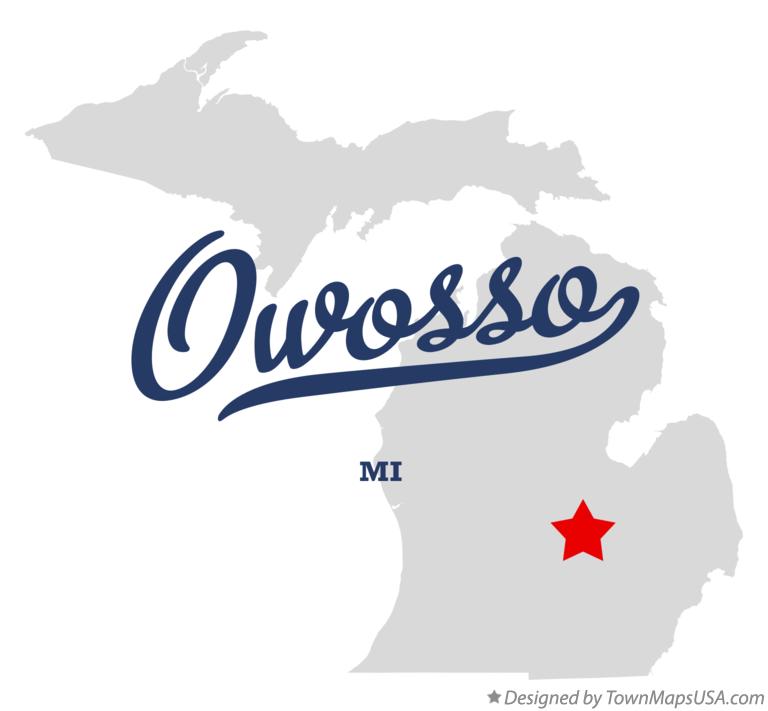 Reposted from Argus-Press.com
Reposted from Argus-Press.com
OWOSSO — The city council this week passed a resolution to support a “complete streets” initiative that promotes safe and efficient movement for vehicles, bicyclists and pedestrians while planning and designing roadway construction.
The resolution states, when feasible, the city will “incorporate the complete street design considerations as a routine part of infrastructure planning and implementation.”
The inclusion of infrastructure like bike lanes and additional easier-to-use crosswalks offers health benefits for the population and makes Owosso a more livable community, the resolution states.
The resolution also requires the Michigan Department of Transportation to consult with city officials when undergoing projects on state highways within the city limits. MDOT is not currently required to seek city input when doing work on state highways such as M-21 and M-52.
Council members expressed concern with MDOT and the lack of communication they had when work was done in the past.
City Manager Don Crawford said the city received notice from MDOT that the organization is requesting engineers to design M-21 west of M-52 and M-52 north of Main Street. He expects MDOT to award the design sometime in the near future.
How much consulting and how much consideration MDOT will give to local input was questioned by some council members.















